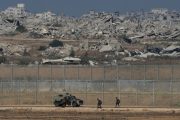Islamic State (ISIS) militants killed a U.S. Navy SEAL serving as an advisor to Kurdish Peshmerga forces near the town of Tel Asqof, northern Iraq, on May 3. Pentagon press secretary Peter Cook released a statement that the SEAL was killed during an ISIS assault “on a Peshmerga position approximately three to five kilometers behind the forward line of troops.”
The Peshmerga are the armed forces of the autonomous Kurdistan Regional Government (KRG) of Iraq. An article in the National Interest last January noted: “The KRG is the most stable part of Iraq, and hosts some two million Arab refugees, including many Christians who fled ISIS persecution in Mosul.” After the Iraqi military proved to be ineffective in stopping ISIS from capturing Mosul in 2014, the Peshmerga filled the gap and became an invaluable part of the anti-ISIS coalition.
A Reuters report cited a statement from an unnamed senior Peshmerga official who said that ISIS insurgents had occupied Tel Asqof at dawn on May 3, but were driven out later in the day by the Peshmerga. A U.S. military official said the coalition had helped the Peshmerga with air support from F-15 jets and drones.
The official, speaking on condition of anonymity, said the American was killed “by direct fire” from ISIS militants.
Reuters also cited a statement from the leader of a Christian militia deployed alongside the Peshmerga in Tel Asqof who said the ISIS insurgents had used multiple suicide bombers, some driving vehicles laden with explosives, to penetrate Peshmerga lines.
A senior U.S. military official told CBS News that U.S. F-15 fighter jets and drones provided air support to the Peshmerga forces during what was described as an intense battle.
The United States has been bombing ISIS positions and providing air support for Iraqi army and Peshmerga operations since 2014.
The May 3 death of the SEAL was the third U.S. combat casualty since the United States redeployed forces to Iraq in the summer of 2014 to advise local forces and conduct special operations against ISIS. Marine Staff Sergeant Louis Cardin was killed by enemy rocket fire in northern Iraq in mid-March. Prior to that, the last U.S. combat death in Iraq was in October 2015, when Special Forces Master Sergeant Joshua Wheeler was killed during a raid with Kurdish Iraqi forces to free dozens of hostages held in a prison run by ISIS militants near the city of Hawija, in the province of Kirkuk.
The military intervention against ISIS in both Iraq and Syria was given the name Operation Inherent Resolve on October 15, 2014, several months after the United States sent military advisors to Northern Iraq. There have been approximately 4,500 U.S. military deaths in Iraq — beginning with the 2003 U.S. invasion of Iraq, and the ensuing occupation and counter insurgency operations. (Estimates of Iraqi war deaths range from about 100,000 to more than 1,000,000.) U.S. involvement in Iraq officially ended on August 18, 2010, when the last American combat brigades departed for Kuwait.
A May 3 report in the Washington Post observed that this latest U.S. combat death in Iraq, which occurred just two or three miles from the front lines north of Mosul, was indicative of a change in strategy by the U.S. military. The Post writer noted:
The troops are moving outside the confines of more established bases to give closer support to the Iraqi army as it prepares for an assault on the northern city of Mosul — putting them closer to danger.
The report noted that Operation Inherent Resolve began in 2014 with an initial contingent of only 275 troops. As of April, the Defense Department authorized an increase to 4,087 troops.
During an April 25 briefing at the Pentagon, a journalist — noting that the secretary of defense had announced the previous week that 217 soldiers would be deploying to Iraq and President Obama had announced that 250 more were going to Syria — asked Pentagon Press Secretary Peter Cook if he expected another 200 to be announced the next week.
After Cook said: “We’re going to continue to look at every single opportunity we have, worked with our local partners, to see how we can accelerate this campaign,” the journalist asked: “How is this not a mission creep? Just going a little step-by-step, with these steps?”
Considering the escalation of U.S. forces in Iraq from 275 troops to more than 4,000 in two years, such “mission creep” seems to be a distinct possibility — in both Syria and Iraq.
It cannot be repeated too many times that ISIS first gained power in Iraq by filling the vacuum left in the country after our government removed strongman Saddam Hussein from power.
Though Saddam was certainly no humanitarian, the thousands of Christians and other minorities who have fled Mosul and surrounding areas for a safe haven in Kurdistan to escape from ISIS were allowed to live peacefully under his regime.
It is safe to say that, had the United States left Saddam Hussein in place, ISIS would never have gained such dominance in the region.
The interventionist foreign policy that began under George W. Bush was continued under Barack Obama, compounding the problem. As was noted in an article posted by The New American on June 15, 2014: “Over the last week, al-Qaeda-linked jihadists styling themselves the ‘Islamic State of Iraq and the Levant’ (ISIS) receiving weapons and taxpayer funding from the Obama administration in Syria have seized control in wide swaths of Iraq.”
Our government continues to spend money and lives in Iraq and Syria as we write, and this latest death of a brave American will surely not be the last.
Related articles:
ISIS: The Best Terror Threat U.S. Tax Money Can Buy
In Syria, Obama-backed “Rebels” Battle Obama-backed Militias
Blair Calls for West to Send Ground Troops Against ISIS
U.S. Allies in Syria are Now Fighting Each Other
Anti-ISIS Coalition Built ISIS (Video)
U.S. Intel: Obama Coalition Supported Islamic State in Syria
Pentagon Modifies Syrian Rebel Training, Drawing U.S. Further Into War
Another Rebel Division Trained by Obama Joins Al-Qaeda
U.S. Intel: Obama Coalition Supported Islamic State in Syria
Al-Qaeda Splinter Group’s Insurgents Overrun Mosul, Iraq
In Iraq, U.S. Foreign Policy and Obama’s “Rebels” Strike Again
Jesuit Priest Murdered in Syrian City of Homs
Christians in Mosul, Iraq, Pay “Protection” Tax
Obama Helped ISIS in Syria, Now Fights It in Iraq
U.S. Bombs 41 $250,000 Humvees Captured by ISIS
British SAS Forces in Syria Disguise Themselves as ISIS Fighters
Top Syrian Rebel Group Merges With Al-Qaeda in Iraq
Obama’s “Anti-ISIS” Coalition Built ISIS, Biden Admits
Obama Helped ISIS in Syria, Now Fights It in Iraq
ISIS Seized $1 Billion of U.S. Military Aid, Iraqi Leader Admits
U.S. Intel: Obama Coalition Supported Islamic State in Syria
The War on Terror Is Creating More Terror




